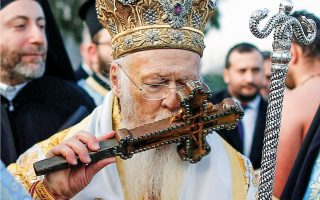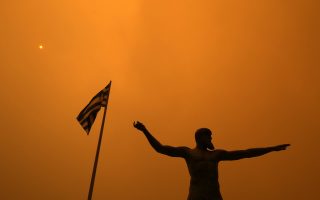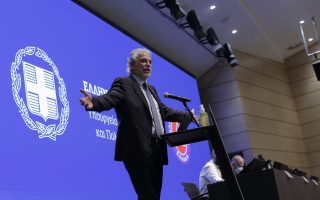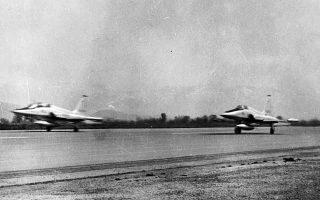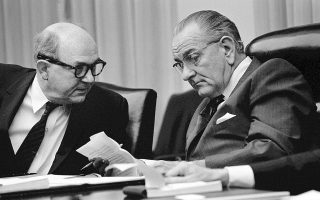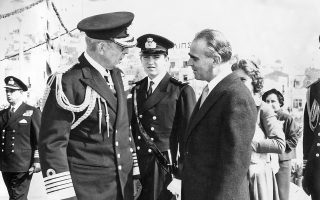Vartholomaios: The industrious patriarch
In 30 years as spiritual leader of the Greek Orthodox Church, he has been a tireless advocate of diplomacy and champion of the environment
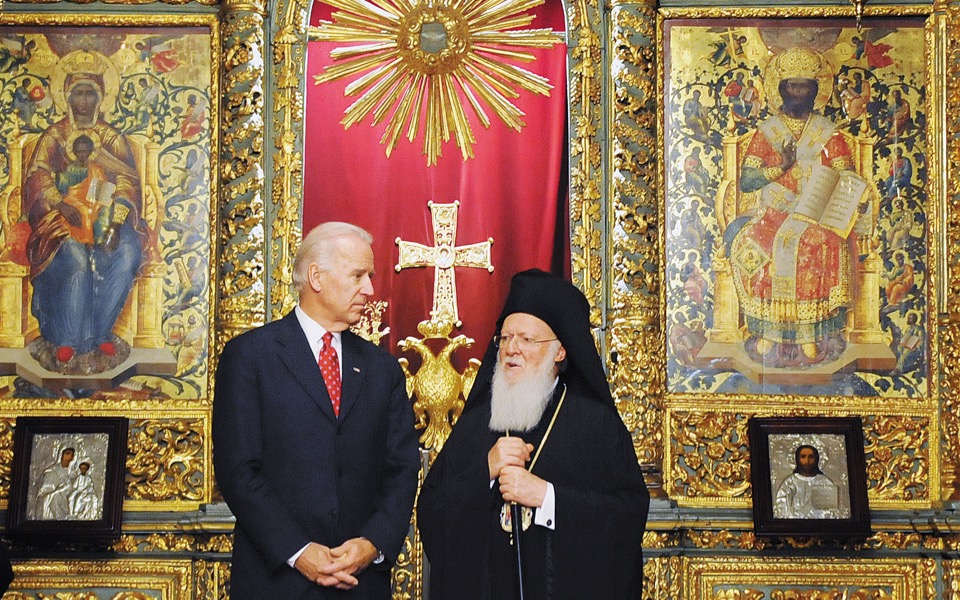
Ecumenical Patriarch Vartholomaios celebrated two important milestones this year: 60 years in the priesthood and 30 years since he assumed the mantle of spiritual leader of the Greek Orthodox Church. Born Dimitrios Archontonis on the Aegean island of Imbros, he was universally elected ecumenical patriarch on October 22, 1991. He is the longest serving patriarch since the Fall of Constantinople. Those near him speak of his perseverance, his diligence and his attentiveness. They stress the fact that he makes great sacrifices to achieve the goals he sets out for the Ecumenical Patriarchate and the Greek minority.
Anyone who visits him will not fail to notice the stacks of envelopes on his desk. Vartholomaios reads and replies to most of the letters he receives, as well as taking an active part in editing his speeches and proposals. He also wants to be kept fully aware of every development in the Phanar and the other provinces of the Ecumenical See.
He has significantly contributed to interfaith and inter-Christian dialogue during his 30-year tenure as patriarch. He has also made significant efforts to bring the Church and the modern world closer, not to mention his work for the protection of our natural environment.
Halki Seminary
From the very first day of assuming the role of patriarch, one of his key priorities was the reopening of the Theological School of Halki, which was shut down in 1971. He has reached out to this end to numerous Turkish prime ministers and presidents, and has spoken to many world leaders in a bid to drum up international support for an issue that is so important to the survival of the Ecumenical Patriarchate.
He maintains ties with local authorities and frequently visits Turkish regions with strong connections to Orthodoxy – like Cappadocia, Demre (Myra) or Bergama (Pergamon) – where he conducts religious services in churches that have been silent for decades. He was, for example, responsible for the first service to be held at the historic Monastery of Panagia Soumela since the 1919-1922 Asia Minor Campaign, on August 15, 2010.
Similarly, in 2019 he held a blessing of the waters to mark the Epiphany in Bursa, the first such ceremony there since 1922. In the difficult years of the 1990s and the early 2000s, he was not intimidated nor did he back down when groups of nationalists would gather at the Phanar to protest the blessing of the waters of the Golden Horn, just outside the Patriarchate.
He is also the best traveled patriarch out of all his predecessors. His visits to the United States, Australia, Korea, the Amazon and many countries in Europe took place as part of this wider effort. He also had a very long conversation with Fidel Castro when he visited Cuba.
Relations with Erdogan
From the day Recep Tayyip Erdogan came to power in Ankara, the two men have had a relationship of mutual respect and a good level of communication. Erdogan joined the Patriarch, for example, when he visited the Prinkipo Greek Orthodox Orphanage. This was at a time when the Turkish government went to great lengths to align itself with the European Union. Sovereignty of the orphanage was returned to the Patriarchate on a decision by the European Court of Human Rights – and the acquiescence of the Turkish government that abided by the ruling. To this day, Erdogan and Vartholomaios communicate on the same level.
Orthodox assemblies
Vartholomaios has always strived to bring the Orthodox churches closer. In March 1992, he invited the Orthodox leaders to the Phanar to share a message of unity with the world. These assemblies would be repeated on the island of Patmos, in Sofia, Jerusalem, Iznik and, of course, the Phanar. They culminated in the Holy and Great Synod of the Orthodox Church, which, after almost 50 years of planning, finally took place on Crete in 2016. It was a particularly difficult endeavor which some churches sought to derail, but thanks to his diplomatic skills, as well as his diligence and persuasive nature, the patriarch managed to fulfil a goal few believed would ever be achieved.
There are other important milestones throughout his tenure, such as the revival of the Orthodox Church of Albania in 1992 and the recognition of the autocephaly of the Orthodox Church of Czech Lands and Slovakia in 1998. In 1996, the Patriarchate also recognized the autonomy of the Orthodox Church of Estonia and granted autocephaly to the Church of Ukraine in 2019, resulting in the Patriarchate of Moscow severing all communications with the Ecumenical Patriarchate. This autocephaly was a result of a concerted and significant effort by both the Ukrainian side and the Patriarchate.
Vartholomaios has also made a concerted effort to approach the Roman Catholic Church. In 1995 he visited the Vatican and met with Pope John Paul II. In 2006, Pope Benedict XVI traveled to the Phanar and co-signed a Common Declaration with the patriarch. In turn, the patriarch traveled to the Vatican once again. He was also present at the inauguration of Pope Francis in Rome in 2013, becoming the first ecumenical patriarch to attend a papal inauguration ceremony since the Great Schism of 1054. Then, in 2014, the Vartholomaios and Pope Francis prayed together at the Church of the Holy Sepulchre and co-signed a joint declaration, in which both men stated that they look forward to the day where there will be full communion between the Orthodox and Roman Catholic churches.
His efforts are not restricted to Christianity either. He has initiated interfaith dialogue with the leaders of other monotheistic religions (Islam and Judaism) with peace and the environment being focal points, recognizing the universal nature of these themes. These efforts have garnered him the nickname “the Green Patriarch.” Having recognized the importance of and focusing on environmental issues since the day of his election, he has long argued that they should not be overlooked when setting any religious agendas. He also designated September 1 as the Day of Environmental Protection and regularly organizes symposiums on the subject all over the world.
His contributions do not end there. He has staffed the Patriarchate with young and well-qualified clerics, future heirs to the ecumenical spirit of Orthodoxy. He is personally interested in the renovations of tens of churches in Istanbul, and during his tenure as patriarch there was a long and successful attempt to rejuvenate Hellenism on the island of Imbros.
Despite the exposure, Vartholomaios still lives a simple life. One of the countless examples of this was seen recently during the ceremony to celebrate his 30 years as patriarch: he was greeting the crowd he approached someone and asked “Did that gift I sent for your daughter last week fit her or did you have to change it?”
Meeting with Biden
The request to reopen the Halki Seminary was one of the central issues discussed during Vartholomaios’ recent meeting with US President Joe Biden, Secretary of State Antony Blinken and House of Representatives Speaker Nancy Pelosi, in Washington DC.
Sources told Kathimerini that the meeting took place in a warm and friendly atmosphere. The issue of the Halki Seminary is well known to the US government and it was indicated during the meeting that the pressure for its reopening will not let up.
The patriarch was accompanied by Archbishop Elpidophoros of America and Metropolitan Emmanuel of Chalcedon.
